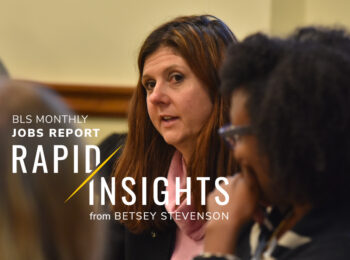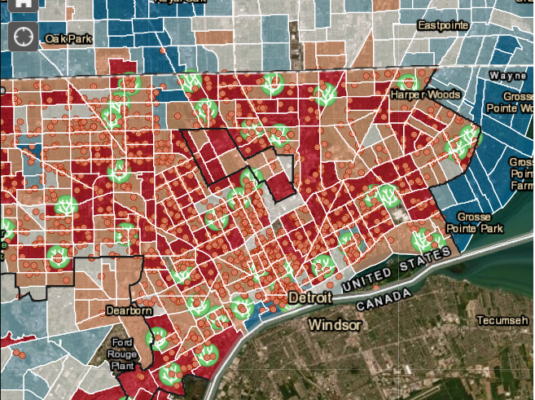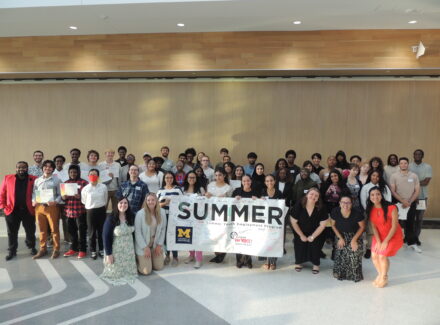
Julie Hui
Assistant Professor of Information, School of Information
Employment is at the center of poverty reduction, and yet there are complex reasons people remain unemployed or out of the labor force entirely. Employment solutions need to consider myriad barriers to employment, including lack of educational attainment or specialized skills, a history of involvement with the criminal justice system, physical and cognitive disabilities, child care needs, and lack of transportation to work, for example.
Below is an overview of the numerous research projects supported by Poverty Solutions that aim to promote a better understanding of the types of employment solutions that could make a difference. Poverty Solutions also coordinates a SummerWorks youth employment program in partnership with the Washtenaw County Office for Community and Economic Development and Michigan Works! Southeast, and we partner with the City of Detroit to support a youth workforce development policy fellowship.
By Karen Kling, H. Luke Shaefer, and Betsey Stevenson
By Sander Levin, Patrick Cooney, and Poverty Solutions Staff
By Julie Hui, Kristin Seefeldt, Lutalo Sanifu, Christie Baer, Jeanette Szomstein, and Tawanna R Dillahunt
Computer-Human Interaction Conference on Human Factors in Computing Systems
By Amanda Nothaft
By Julie Hui, Kristin Seefeldt, Christie Baer, Lutalo Sanifu, Aaron Jackson, and Tawanna R. Dillahunt
Proceedings of the Association for Computing Machinery on Human-Computer Interaction
By Pinghui Wu and Michael Evangelist
Demography
By Jordan Greene and Kristin Seefeldt
Journal of Adolescent Research
By
Health Services Research
By Pinar Üstel, Matthew J. Smith, Shannon Blajeski, Jeffery M. Johnson, Valerie G. Butler, Johanna Nicolia-Adkins, Monica J. Ortquist, Lisa A. Razzano, and Adrienne Lapidos
Journal of Technology in Human Services
By Rachael Kohl
By Tawanna Dillahunt, Alex Jiahong Lu, and Afton Branche-Wilson
By Poverty Solutions, The Center on Poverty and Inequality at Georgetown Law, The Century Foundation, The Arc of the US, The Association of University Centers on Disabilities, and The National Association of Councils on Developmental Disabilities
By H. Luke Shaefer and Joshua Rivera
By Pinghui Wu, Joshua Rivera, and Samiul Jubaed
By Patrick Cooney
By Chris Warland and Melissa Young
By Harry Holzer and Joshua Rivera
By Tawanna R. Dillahunt and Alex Lu
Computer-Human Interaction (CHI) Conference on Human Factors in Computing Systems
By Sruthi Naraharisetti, Natalie Peterson, and Jennifer Erb-Downward
By Angela Bruns and Natasha Pilkauskas
Women’s Health Issues
By Michael Evangelist, Lucie Kalousová, and Sarah Seelye
By Jeremy Lapedis, Edith C. Kieffer, Carrie Rheingans, and Marianne Udow-Phillips
By Natasha Pilkauskas, Jeanne Brooks-Gunn, and Jane Waldfogel
By Christine Robinson, Trina Shanks, and Patrick Meehan

News

News

News
Using monthly data released by the Bureau of Labor Statistics, U-M’s Rapid Insights Jobs Report analysis provides key charts and findings that highlight new developments in the labor market.
U-M is an active partner in this local Washtenaw County Summer Youth Employment Program, a 10-week summer employment and mentorship program that pairs employers with local youth to provide on-the-job training.

Visit the Data Tools page for an interactive map that shows Detroit’s digital divide.

Concentrate | Feb. 12, 2025
Fox 17 West Michigan | Jan. 19, 2025

Planet Detroit | Dec. 12, 2024